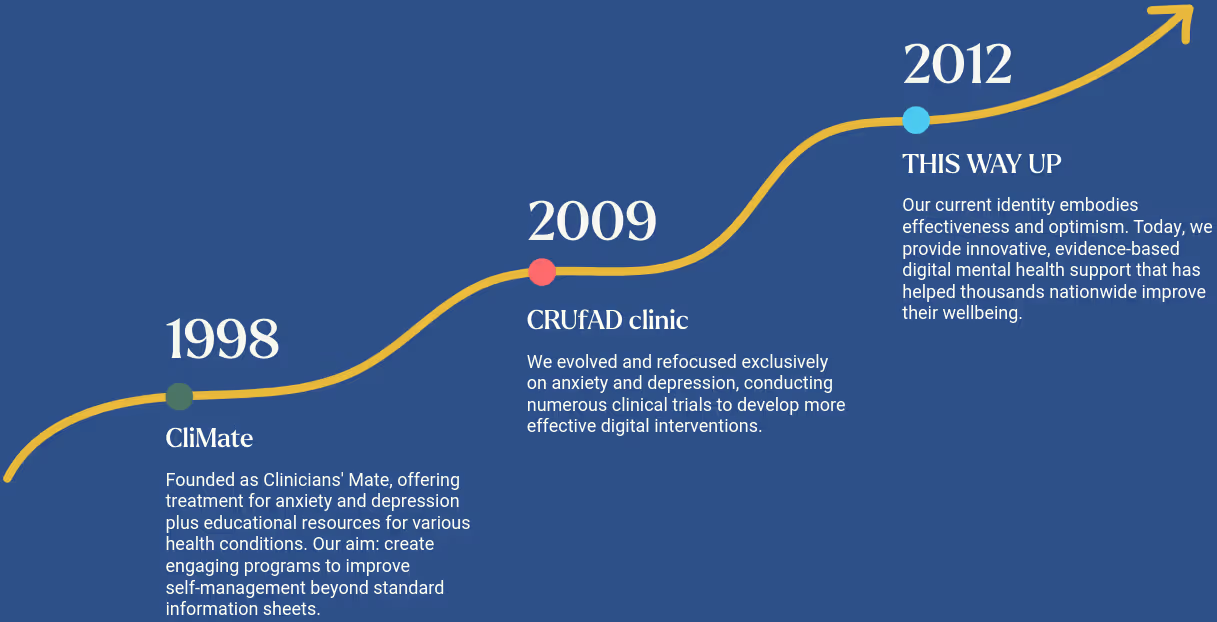Cognitive Behavioural Therapy Explained
What is Cognitive Behavioural Therapy?
Cognitive Behavioural Therapy (better known as CBT) is a skills-based, internationally recommended mental health treatment. Like the name suggests, CBT targets the cognitions (i.e. things you think) and behaviours (i.e. things you do) that contribute to conditions like anxiety and depression. CBT focuses on the present and tends to suit people interested in learning practical skills for boosting their mental health.

Take a test to see if CBT might help
If you’re unsure about the way you feel, take our anonymous online Wellbeing Test to check your levels of stress, anxiety, or depression, and see if you might benefit from taking one of our online CBT programs.
How effective is CBT?
Scientific research has shown that CBT is an effective treatment for many mental health issues, especially anxiety and depression.
Most CBT skills, like problem solving or self-care, are useful for things like adjusting to change or coping with stressful life events. Moreover, CBT skills are learned through practice. People who continue to use CBT skills after finishing therapy can make lasting and meaningful improvements to their quality of life.
How can I access CBT?
CBT is generally an accessible form of therapy. It’s quite flexible and can be done in one-on-one therapy (either in person or via telehealth), in group therapy, or as a structured self-learning online program (aka iCBT).
There are two main ways to access CBT – either face-to-face (1:1 or in a group, in-person or online via telehealth) or as a self-paced online program (often called internet-delivered (iCBT), computerised (cCBT) or eCBT.
iCBT has the same principles as CBT – it helps people change the unhelpful thoughts and behaviours that tend to maintain their symptoms and worsen their mental health. In Australia, if you want to access individual or group CBT, you can ask your doctor for a referral, contact a mental health therapist directly, or check out one of our online CBT programs.
Here are the main differences between face-to-face CBT and internet-delivered CBT:
Face to face CBT
- Done in person as individual sessions or group therapy
- Can be tailored by the clinician to suit individual needs
- Consists of 5 to 20 sessions, on average
- Content and strategies taught depends on the clinician
- Can be expensive (e.g. $150+ per session)
- Full or partial cost can sometimes be covered by Medicare
- Relies on regular attendance and ongoing clinical support
- May require referrals and recommendations
- Can have long waiting lists
- Can be limited in some areas (e.g. rural communities)
Internet-delivered CBT or iCBT
- Accessed online anytime
- Structured teaching of CBT skills
- Consists of 4 to 10 lessons, on average
- Consistent in content and strategies taught
- Usually more affordable (e.g. $60 per program)
- Cost not yet covered by Medicare
- Can be done independently or with your clinician
- Can be accessed as self-help or prescribed quickly
- Usually can be accessible immediately
- Accessible anywhere you can connect to the internet
Does iCBT work?
Yes! We and other researchers have conducted numerous randomised controlled trials (i.e. proper scientific research) into iCBT.
Overall, 80% of people who complete their program feel that their mental health significantly improved, 50% to the point of no longer being troubled by anxiety or depression. Other research has found that the benefits of iCBT lasts longer than medication and is about the same as face-to-face CBT. Moreover, iCBT can be combined with prescribed medications and can also be used alongside traditional CBT.

Ready to tackle the way you feel?
Browse our range of clinically-proven online CBT treatments that teach practical strategies for tackling your symptoms.



